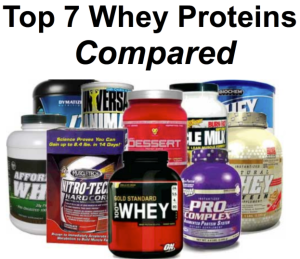Contents
What is whey protein?
Whey protein is the dominant protein in cows’ milk. It makes up approximately 20%, while the rest is casein.
Whey is separated from casein using a series of filters. It is then purified through an iron exchange process, before it is dried into a powder. This powder is then used as a dietary supplement.
Whey is a so-called complete protein because it contains all nine essential amino acids. It is famous as a sports supplement for helping build muscle mass, although it has other health benefits too.
Whey types
Whey protein is broken down into three main types that contain a mixture of bovine serum albumin, alpha-lactalbumin, beta-lactoglobulin, and immunoglobins. These include WPC, WPI, and WPH.
Whey Protein Concentrate (WPC) – The protein content of WPC can vary ranging from 30% through to 90%. It contains low concentrations of lactose (carbohydrates) and fat.
Whey Protein Isolate (WPI) – More highly processed compared with WPC, this form of whey protein lacks lactose and fat. Protein is typically concentrated at 90%.
Whey Protein Hydrolysate (WPH) – This is the easiest form of whey protein to digest. This is because it has undergone a process called partial hydrolysis which is a prerequisite for the body to effectively absorb the protein. Infant formulas and medical protein supplements often use WPH, because of its reduced allergen risk and easy digestion.
Why choose whey for building muscle?
Exercising puts muscles under a lot of pressure, especially during resistance training. This causes slight damage to the muscle fibres, but this is completely normal. This natural process encourages muscle re-growth and improves strength.
Following training the body undergoes muscle breakdown and protein synthesis. This period of time is the ‘anabolic window’. This is because the body is craving energy to help repair and build muscles, and it is very receptive to protein absorption.
They body easily absorbs whey, because it has a protein content. This makes it ideal for helping to boost muscle repair and muscle building following exercise. With all the essential amino acids available in whey protein, the muscles have everything they need for healthy development.
Several studies have demonstrated the positive effects of whey protein on muscle building in the context of resistance training1, 2. Research shows that supplementation with whey protein during resistance training increases lean tissue mass faster compared with resistance training alone. Furthermore, whey protein supplementation has been shown to significantly decrease body fat and increase strength and lean body mass faster compared with supplementation with casein.
Other health benefits
In addition to supporting muscle growth, whey protein has other benefits. It can help with weight loss, and lowering cholesterol and blood pressure. Whey protein also supports antioxidant activity that boosts immune function. This may help protect the body from cancer and other diseases.
Weight loss
There is some evidence that regularly taking whey protein may help with weight loss. In one study, participants taking a specialised whey formula (Prolibra) preserved a higher percentage of lean muscle mass and lost significantly more body fat compared with the control group3.
Prolibra is a whey fraction with a high concentration of milk calcium, bioactive peptides, and leucine. The amino acid leucine is a well-known appetite suppressant. This helps lower calorie intake and stimulates weight loss.
Another study found that whey protein can help to reduce ghrelin secretion4. The body releases Ghrelin when the stomach is empty and signals that the body needs to eat. This is why it is called the ‘hunger hormone’. In this study, obese men taking whey protein had significantly lower levels of ghrelin for up to four hours, which reduced their appetite.
Anti-cancer properties
There is a growing body of research that suggests whey protein may have important anti-cancer benefits. Studies show that whey protein can increase glutathione concentration (a powerful antioxidant), plus exhibit antitumor activity 5, 6. Whey protein can have overall health benefits by supporting better immune function.
Lower LDL cholesterol
One study has shown that whey protein may help to lower bad cholesterol levels and better protect the body from heart disease. After 12 weeks of supplementation with either whey protein, casein, or glucose (control), participants receiving whey protein had lower LDL cholesterol7.
Blood pressure
People with high blood pressure may benefit from whey protein supplementation. One study has shown that when whey protein is added to beverages it can lower blood pressure in individuals with raised diastolic and systolic blood pressure8. This may help to reduce the risk of heart attacks or strokes.
Asthma
Initial research suggests that whey protein may help children suffering from asthma. In this small study, children that received whey protein had higher concentrations of glutathione compared with the control group. As a result, these children exhibited an improved cytokine response in atopic asthma9.
Recommended dosage
Like all supplements, the amount of whey protein you should take depends on several factors. These include the type of whey protein (WPC, WPI, or WPH), its concentration, individual body weight, and the purpose of supplementation.
As a very rough guide, the ideal amount of protein daily per pound of body weight is:
- Recreational athletes – 0.5-0.75 grams
- Competitive athletes – 0.6-0.9 grams
- Teenage athletes – 0.8-0.9 grams
- Athletes building muscle mass – 0.7-0.9 grams
It is also important to consider when you are planning to take supplements. Approximately 30-60 minutes before your workout is the ideal time to consume whey protein. The body absorbs it quickly making it readily available in the blood stream during the workout. The benefits are immediate muscle repair and boosting your energy during training. Following a workout, it is best to take whey protein in conjunction with a carbohydrate. This helps recovery and muscle building, as well as replenishing glycogen and glucose levels.
It is always a good idea to consult a nutritionist or your doctor before starting any supplementation program, especially if you have any other health problems.
Potential side effects
Generally most people don’t suffer adverse reactions to moderate whey protein supplementation. However, individuals allergic to milk may have a negative reaction to whey.
Excessive consumption of whey protein may cause cramps, stomach pain, nausea, low appetite, headaches, and fatigue.
References
- Darren G. Burke, Philip D. Chilibeck, K. Shawn Davison, Darren G. Candow, Jon Farthing, and Truis Smith-Palmer. (2011). The Effect of Whey Protein Supplementation With or Without Creatine Monohydrate Combined With Resistance Training on Lean Tissue Mass and Muscle Strength. International Journal of Sport Nutrition and Exercise Metabolism. Volume 11, 349-364. ↩
- Paul J. Cribb, Andrew D. Williams, Michael F. Carey, and Alan Hayes. (2006). The Effect of Whey Isolate and Resistance Training on Strength, Body Composition, and Plasma Glutamine. International Journal of Sport Nutrition and Exercise Metabolism. Volume 16, 494-509. ↩
- Joy L Frestedt, John L Zenk, Michael A Kuskowski, Loren S Ward, Eric D Bastian. (2008) A whey-protein supplement increases fat loss and spares lean muscle in obese subjects: a randomized human clinical study. Nutrition & Metabolism. Volume 5, Issue 8 doi: 10.1186/1743-7075-5-8. ↩
- Bowen, J. Noakes, M. and Clifton, P. (2007). Appetite hormones and energy intake in obese men after consumption of fructose, glucose and whey protein beverages. International Journal of Obesity. Volume 31, Issue 11, 1696-703. ↩
- Bounous, G. Batist G. Gold, P. (1991). Whey proteins in cancer prevention. Cancer Letters. Volume 57, Issue 2, 91-4. ↩
- Bounous, G. (2000). Whey protein concentrate (WPC) and glutathione modulation in cancer treatment. Anticancer Research. Volume 20, Issue 6C, 4785-92. ↩
- Pal S, Ellis V, Dhaliwal S. (2010). Effects of whey protein isolate on body composition, lipids, insulin and glucose in overweight and obese individuals. The British Journal of Nutrition. Volume 104, Issue 5, 716-23. ↩
- Fluegel, S, Shultz, T., Powers, J., Clark, S. et. al. (2010). Whey beverages decrease blood pressure in prehypertensive and hypertensive young men and women. International Dairy Journal. Volume 20, Issue 11, 753-60. ↩
- Lothian JB, Grey V, Lands LC. (2006). Effect of whey protein to modulate immune response in children with atopic asthma. International Journal of Food Sciences and Nutrition. Volume 57, Issue 3-4, 204-11. ↩



